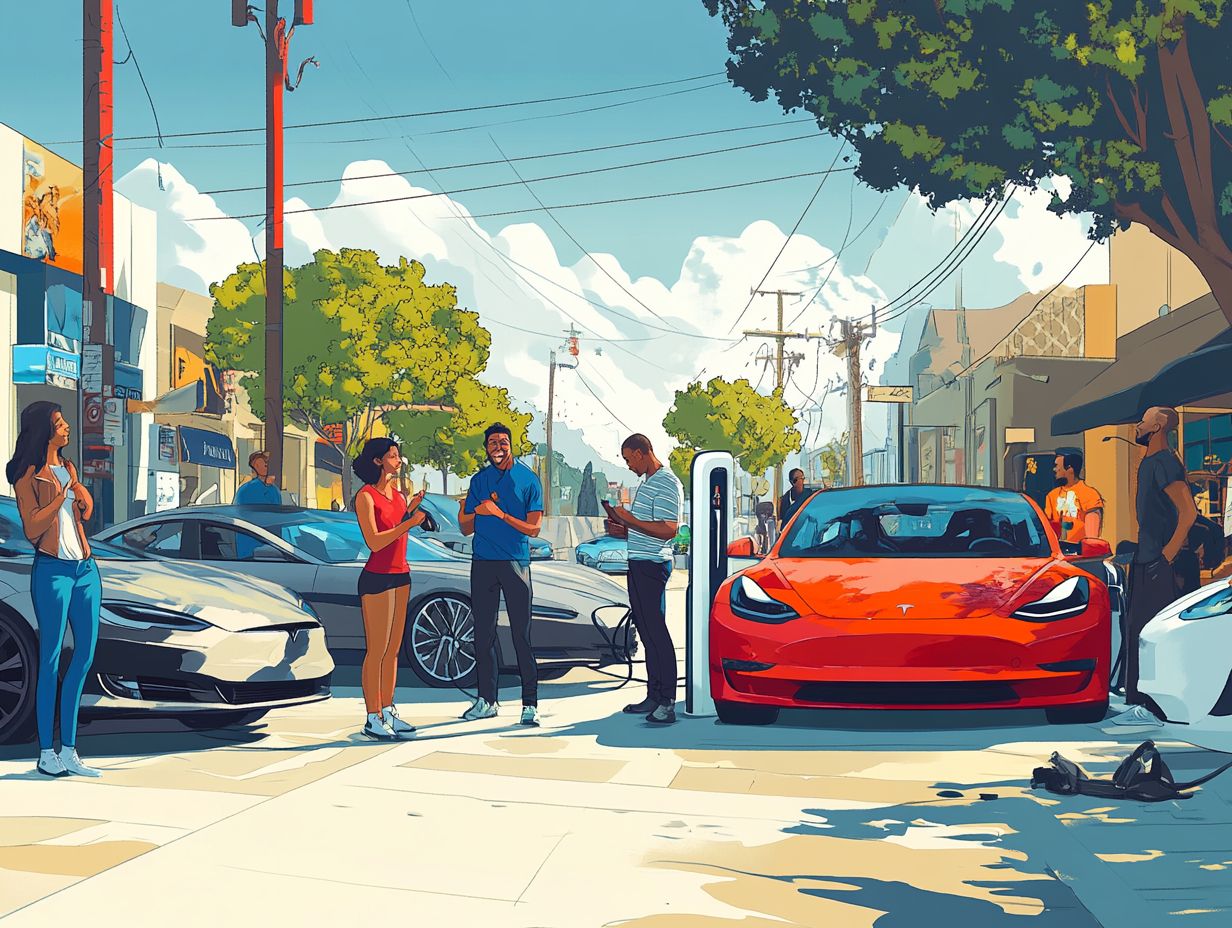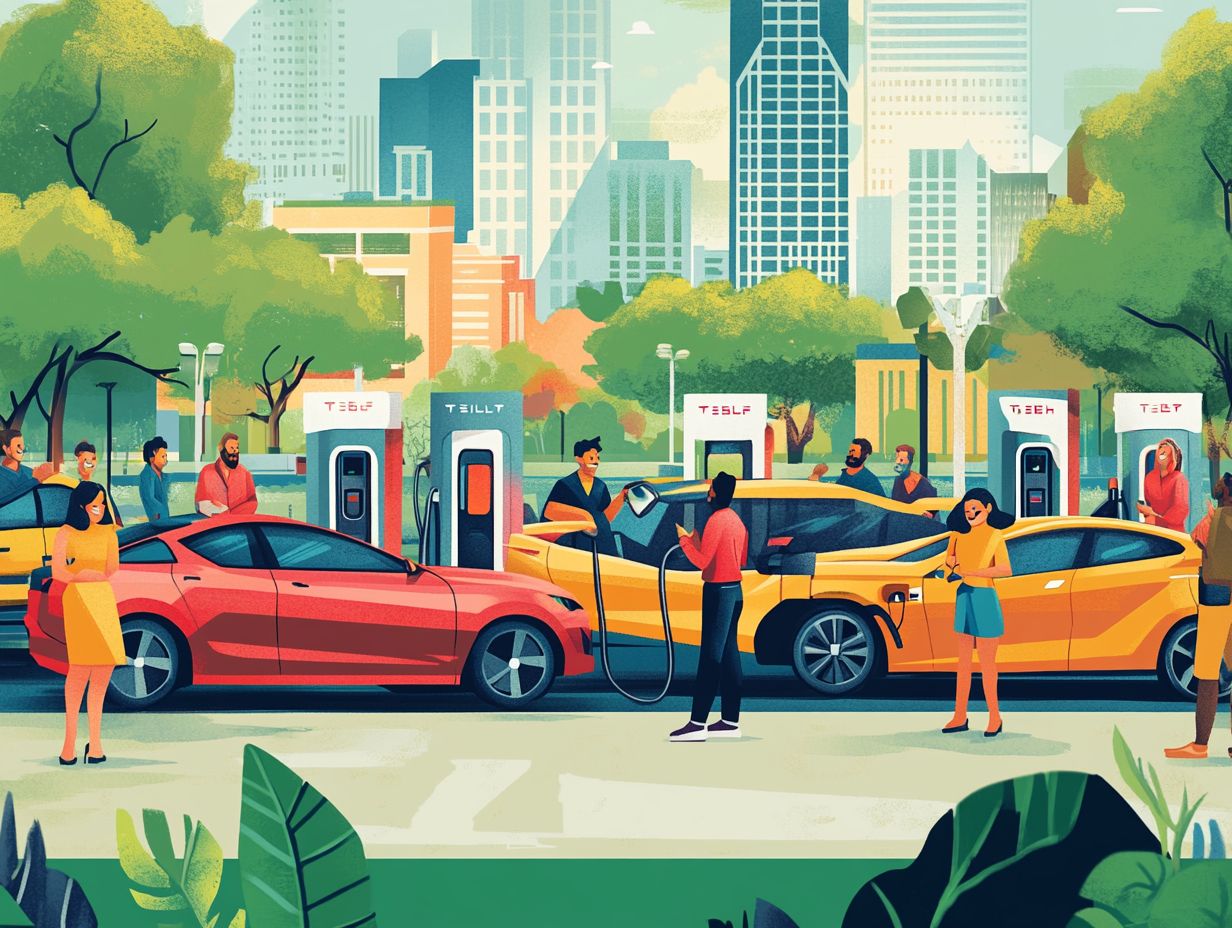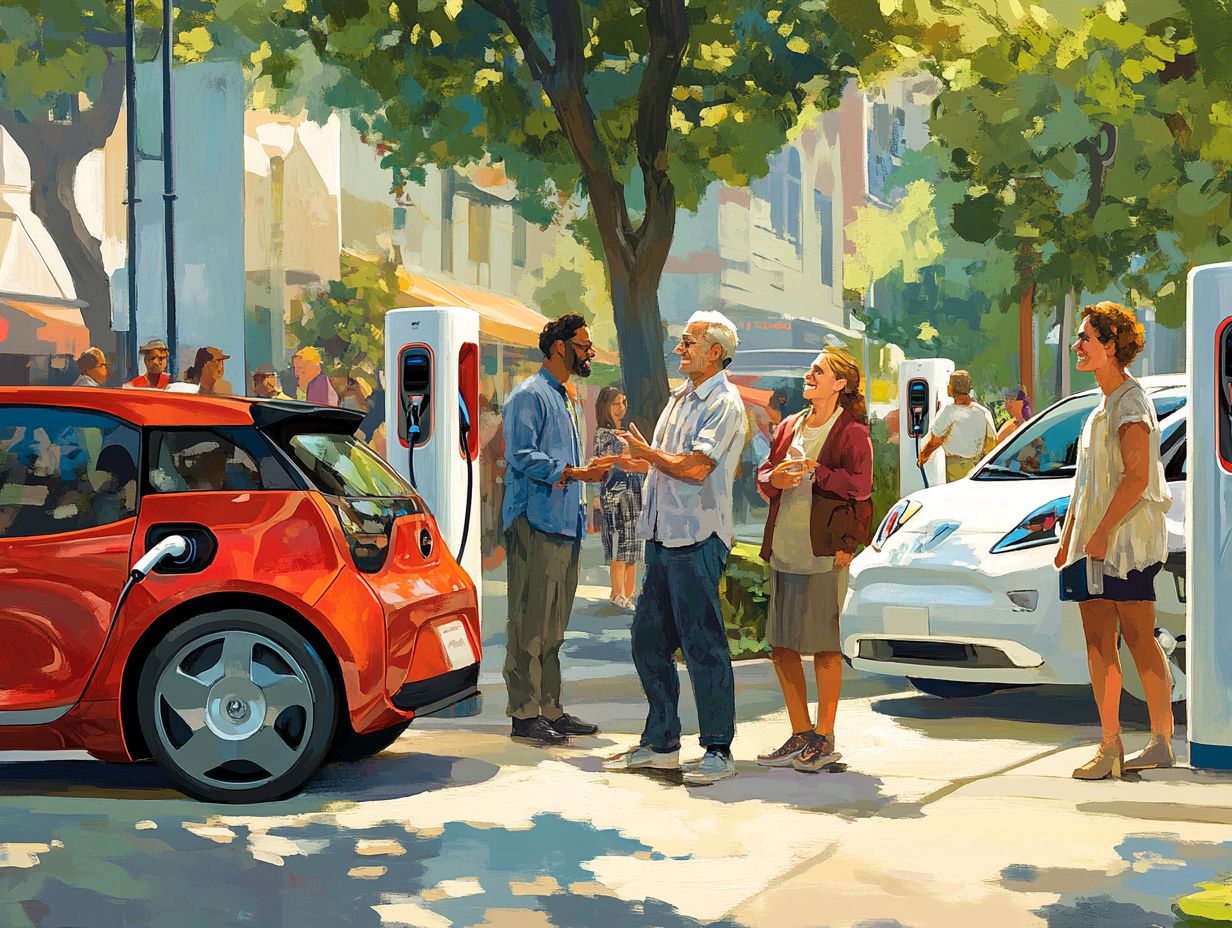Real User Experiences: Electric Vehicles
Considering an electric vehicle (EV) can be an exhilarating yet overwhelming journey for you. The allure of eco-friendliness and cutting-edge technology is undeniably attractive, but you may encounter some substantial challenges along the way.
From the significant initial investment to the sometimes inadequate charging infrastructure, grasping these hurdles is essential for making informed choices. This article delves into authentic user experiences of owning an EV, shedding light on common concerns and practical solutions. Let s embark on this exploration together, navigating the complexities and benefits of embracing electric mobility.
Contents
- Key Takeaways:
- 1. The Initial Investment Can Be Costly
- 2. Limited Range and Charging Time
- 3. Lack of Availability of Charging Stations
- 4. Maintenance and Repairs Can Be Expensive
- 5. Limited Options for Models and Features
- 6. Longer Road Trips Can Be Challenging
- 7. Dependence on Battery Life and Weather Conditions
- 8. Difficulty Finding Qualified Mechanics
- 9. Potential for Decreased Resale Value
- 10. Upfront Research and Planning is Necessary
- Why You Should Consider an Electric Vehicle Today!
- How Can You Overcome the Challenges of Owning an Electric Vehicle?
- What Are the Long-Term Savings of Owning an Electric Vehicle?
- How Has the Electric Vehicle Industry Evolved in Recent Years?
- What Are Some Common Myths About Electric Vehicles?
- How Can One Determine If an Electric Vehicle Is Right for Them?
- Frequently Asked Questions
- 1. What is the advantage of using an electric vehicle compared to a traditional gas-powered car?
- 2. How far can an electric vehicle travel on a single charge?
- 3. Are electric vehicles suitable for long-distance trips?
- 4. What is the charging time for an electric vehicle?
- 5. What are the main challenges of owning an electric vehicle?
- 6. Do electric vehicles require regular maintenance?
Key Takeaways:

- Owning an electric vehicle can be expensive upfront due to the initial investment and potential for decreased resale value.
- Limited range, long charging times, and a lack of charging stations may pose challenges for electric vehicle owners.
- Proper research and planning are necessary for owning an electric vehicle, but long-term savings and benefits can outweigh the challenges.
1. The Initial Investment Can Be Costly
Investing in electric vehicles like the BMW i3, Nissan Leaf, or Tesla may require a substantial upfront cost. This can understandably deter you despite the long-term benefits of reduced environmental impact and lower carbon dioxide emissions associated with electric motoring.
The price of lithium-ion batteries, which are rechargeable batteries commonly used in EVs, significantly contributes to this initial expense. However, as a savvy buyer, it s worth exploring available incentives or rebates from federal and state governments, as these can substantially offset your initial investment.
While traditional vehicles may seem more budget-friendly at first glance, the long-term savings you can achieve from reduced fuel costs, lower maintenance expenses, and even decreased insurance premiums make EVs a financially astute choice. Beyond immediate cost savings, electric vehicles also enable you to contribute to a more sustainable future by reducing reliance on fossil fuels, enhancing overall environmental health.
2. Limited Range and Charging Time
One of the primary concerns for you as a potential electric vehicle owner is range anxiety. This term refers to the nagging fear that your vehicle might not have enough battery power to get you where you need to go. This concern is made even more pressing by the reality that charging takes longer compared to the quick pit stops of traditional refueling.
Typically, the average range of popular electric vehicles hovers between 200 to 300 miles on a single charge. However, this range isn t set in stone; it can fluctuate based on driving conditions. Frequent stops, extreme weather, and even a lead foot can all drain your battery faster than you d like.
As your vehicle s battery ages, its efficiency may wane, further impacting your driving range. Most electric vehicles can take anywhere from 30 minutes to several hours to charge depending on the type of charger you use while traditional gasoline vehicles can be refueled in just a few minutes.
The good news? Technology is advancing rapidly. Innovations like fast-charging stations and improved battery chemistry are on the horizon, promising to enhance both your vehicle s range and charging speed in the near future.
Don t miss out on the revolution of electric mobility! Share your own experiences or ask questions about electric vehicles below.
3. Lack of Availability of Charging Stations
The absence of enough charging stations is a major hurdle for electric vehicle adoption. Many potential EV owners feel anxious about finding public charging options on their trips.
Currently, over 100,000 charging stations exist across the U.S. Rapid growth is expected as new initiatives aim to expand this vital network.
Charging stations significantly influence consumer choices. Surveys show that more than 60% of people see access to charging stations as a key concern.
To tackle this, government programs are investing in fast-charging stations along major highways and in cities. These efforts improve public access and build consumer confidence, making electrification a more appealing alternative to traditional vehicles.
4. Maintenance and Repairs Can Be Expensive
Electric vehicles usually require less routine maintenance than gasoline cars. However, repair costs can be high, especially for battery problems that need specialized mechanics.
Unlike gas cars, which often need oil changes and exhaust repairs, electric cars focus on their batteries and software updates. While routine services are easier, unique challenges can arise when issues do occur.
The availability of qualified technicians can vary, sometimes requiring travel to specialized service centers, adding to your expenses. To manage these costs, utilize online resources, community forums, and manufacturer guidelines for helpful tips on maintaining your vehicle.
5. Limited Options for Models and Features
Even with the rising popularity of electric vehicles, the range of models and features is still limited compared to traditional cars. This can restrict your choices, even as brands like Volvo and Porsche work to broaden their electric offerings.
As consumers become more selective, manufacturers are stepping up to deliver a broader selection of models for different budgets and tastes. Luxury electric vehicles now boast plush interiors and advanced technology.
On the budget side, new models designed for everyday drivers are emerging. These cars offer practical features like impressive range and affordable prices.
Looking ahead, the electric vehicle market is poised for explosive growth! With innovations on the horizon, expect more models and better features, including advanced battery technology and smarter connectivity.
6. Longer Road Trips Can Be Challenging

Planning longer road trips in an electric vehicle comes with its own set of challenges. Range anxiety and finding charging stations along your route are common issues that require extra time in planning and adjusting your schedule.
To tackle these hurdles with confidence, make the most of technology. Specialized apps can help locate charging stations and provide real-time information on their availability, making your journey smoother.
Estimate travel times while factoring in charging needs to craft a more realistic itinerary. This approach allows for necessary charging breaks and helps you identify the most efficient stops.
These thoughtful strategies can elevate your long-distance electric drive into an enjoyable and stress-free adventure.
7. Dependence on Battery Life and Weather Conditions
The performance of electric vehicles heavily relies on battery life. Extreme weather conditions can adversely impact this, affecting both range and efficiency.
In hot temperatures, your battery may overheat. Studies show that when temperatures rise above 95 F (approximately 35 C), you could see a reduction in range by as much as 20%.
Cold weather can slow down how the battery works, resulting in reduced capacity and increased energy consumption, often dropping efficiency by 30% or more in sub-zero conditions.
Advancements in battery technology are underway to tackle these challenges. Innovations like thermal management systems (systems that help keep the battery at the right temperature) and improved electrolyte formulations are designed to enhance performance.
These developments ensure optimal operation regardless of environmental factors, allowing you to maximize your electric vehicle experience.
8. Difficulty Finding Qualified Mechanics
As electric vehicles gain traction, locating qualified mechanics who understand EV maintenance and repair can be challenging. This shortage leaves you with limited options for servicing your vehicle.
This situation highlights the urgent need for specialized training programs. These programs should equip technicians with the necessary expertise in high-voltage systems, battery management, and electric drivetrains.
To assist in finding qualified services, various online platforms and resources have emerged, offering directories of trained professionals. Several initiatives are working to strengthen the workforce by partnering with educational institutions to enhance training programs.
9. Potential for Decreased Resale Value
While electric vehicles often hold their value well initially, concerns about battery life and the rapid pace of new model releases can impact resale value.
Understanding these factors can help you maximize your electric vehicle s value! Battery performance is crucial; models with higher capacity and longevity typically retain their desirability much better.
As technology evolves, features like autonomous driving capabilities and enhanced connectivity can dramatically influence market demand. Prevailing market conditions, such as fluctuating fuel prices and government incentives, also play significant roles.
To maintain or enhance your vehicle’s resale value over time, regular maintenance is essential. Stay on top of software updates and ensure your car looks its best with thorough cleaning and repairs.
10. Upfront Research and Planning is Necessary
Owning an electric vehicle demands careful research and planning. This includes understanding essential elements like charging options, battery life, and various vehicle models. This preparation ensures you make an informed decision that fits your needs.
Your journey begins by exploring the diverse electric vehicle models available. Each model features unique specifications tailored to different lifestyles, making it essential to find one that resonates with you.
Understanding your local charging options is crucial. It determines how easily you can power up during daily commutes or longer trips. Additionally, anticipating any maintenance needs can help you avoid unpleasant surprises later.
By evaluating your driving habits like daily mileage and preferred routes you can find the best electric vehicle that aligns with your individual needs. This ensures a smooth transition into an exciting eco-friendly lifestyle.
Why You Should Consider an Electric Vehicle Today!
Electric vehicles offer amazing benefits that make them a smart choice! From a reduced environmental impact to lower operating costs and an enhanced charging experience, the advantages are compelling.
One standout feature is their significant contribution to environmental sustainability. These vehicles produce zero tailpipe emissions, helping improve air quality, especially in urban areas. As an EV owner, you re likely to experience substantial cost savings over time, primarily due to lower maintenance requirements and the generally lower cost of electricity compared to gasoline.
The convenience of charging at home allows you to power up your vehicle overnight, eliminating frequent trips to the gas station. Many real-world examples show these benefits, with countless drivers reporting savings of hundreds to thousands of dollars each year.
Companies like Tesla have optimized energy efficiency and provide robust support with charging infrastructure. This ensures your transition to electric is smooth and effortless.
How Can You Overcome the Challenges of Owning an Electric Vehicle?

To overcome the challenges of owning an electric vehicle, you need proactive strategies. Start with thorough research, utilize resources for charging stations, and stay informed about maintenance options.
Enhance your experience by downloading dedicated apps that provide real-time data on nearby charging stations. These apps detail their availability and charging speeds. Understanding how to manage your battery life effectively like avoiding extreme temperatures and sticking to regular charging schedules will help extend your vehicle s battery life.
It s also wise to familiarize yourself with a reliable service center specializing in electric vehicles for regular check-ups and any necessary repairs. By adopting these practices, you can confidently navigate potential hurdles and enjoy a seamless driving experience.
What Are the Long-Term Savings of Owning an Electric Vehicle?
Owning an electric vehicle presents an opportunity for substantial long-term savings. This is due to reduced fuel costs, lower maintenance expenses, and enticing tax incentives that make EVs financially attractive.
When comparing the costs of electricity to gasoline, it’s clear that charging your EV is significantly more economical. The average cost per mile for an electric vehicle can be as little as a third of what you d spend on a gasoline vehicle. Additionally, with fewer moving parts, electric vehicles require less maintenance over time goodbye oil changes and exhaust system repairs.
On top of that, many governments offer incentives like tax credits, rebates, and grants to encourage the adoption of electric vehicles. This makes EVs more affordable and promotes eco-friendly choices, appealing to environmentally conscious consumers.
Ready to make the switch? Explore your electric vehicle options today and discover the benefits for yourself!
How Has the Electric Vehicle Industry Evolved in Recent Years?
In recent years, you’ve likely noticed a remarkable evolution in the electric vehicle industry. This evolution features impressive advancements in battery performance, a wider array of models from major players like Tesla and the Nissan Leaf, and an increasing public awareness of environmental issues.
This transformation includes enhanced range and efficiency brought on by battery innovation, as well as the growing variety of vehicles available. These are tailored to suit diverse consumer preferences from affordable economy models to opulent luxury options. As the market diversifies, traditional automakers are integrating electric models into their lineups and intensifying competition.
Today, more than ever, consumers like you are prioritizing sustainability in your purchasing decisions. This is prompting a shift towards greener alternatives and urging manufacturers to adapt swiftly in this fast-paced landscape.
What Are Some Common Myths About Electric Vehicles?
Despite the rising popularity of electric vehicles, several persistent myths continue to cloud the conversation. These include misconceptions about their range, maintenance needs, and overall environmental impact compared to traditional vehicles.
These myths can mislead you when choosing your next vehicle! You might worry that an electric vehicle will leave you stranded due to limited battery life, but advancements in technology have significantly extended driving ranges, often exceeding 300 miles on a single charge.
Concerns about high maintenance costs are similarly unfounded. Electric vehicles typically require less frequent servicing and have fewer moving parts than their gasoline counterparts. When you examine the environmental footprint, it becomes clear that electric vehicles can contribute to a substantial reduction in greenhouse gas emissions, especially when charged with renewable energy sources.
How Can One Determine If an Electric Vehicle Is Right for Them?
Determining whether an electric vehicle is the right choice for you involves evaluating your personal driving habits, access to charging stations (places where you can recharge electric vehicles), and budget considerations to ensure the vehicle aligns seamlessly with your lifestyle.
Start by reflecting on your typical daily travel distances and whether the range of an electric car meets those needs. Consider the convenience of charging options, both at home and in public areas. This can significantly influence your overall ownership experience.
You also need to weigh the financial aspects, including the initial purchase price, potential savings on fuel, and any available government incentives that could make your transition to electric driving smoother.
Evaluate these factors to make a smart choice about owning an electric vehicle!
Frequently Asked Questions
1. What is the advantage of using an electric vehicle compared to a traditional gas-powered car?

Electric vehicles have lower operating costs, zero emissions, and require less maintenance compared to gas-powered cars. They also have the potential to reduce your carbon footprint and contribute to a cleaner environment.
2. How far can an electric vehicle travel on a single charge?
The range of an electric vehicle varies depending on the make and model. However, most modern electric vehicles can travel between 200-300 miles on a single charge. As technology advances, the range is expected to increase.
3. Are electric vehicles suitable for long-distance trips?
Yes, electric vehicles are increasingly becoming suitable for long-distance trips. With the growing availability of charging stations, it is now possible to travel long distances in an electric vehicle. However, it’s important to plan your route and charging stops beforehand to ensure a smooth journey.
Ready to explore electric vehicles further? Visit your local dealership for a test drive today!
4. What is the charging time for an electric vehicle?
Charging time varies based on the vehicle’s battery capacity and the type of charging station. On average, it takes 8-12 hours to fully charge an electric vehicle at home using a Level 2 charger.
Using a DC fast charger can significantly cut the charging time to about 30 minutes to an hour.
5. What are the main challenges of owning an electric vehicle?
Owning an electric vehicle comes with challenges. The limited range and availability of charging stations, especially in rural areas, can be a concern.
The upfront cost of an electric vehicle is often higher than that of a traditional gas-powered car. However, these issues should improve as technology advances and the demand for electric vehicles grows.
6. Do electric vehicles require regular maintenance?
Electric vehicles have fewer moving parts than gas-powered cars. This means they generally require less maintenance.
However, regular checks on the battery and other components are important for optimal performance.
It’s crucial to follow the manufacturer’s maintenance guidelines to keep any warranty coverage intact.




